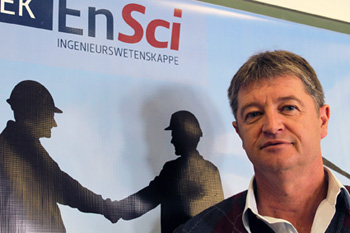Latest News Archive
Please select Category, Year, and then Month to display items
14 June 2024
|
Story Anthony Mthembu
|
Photo Suplied
 Jeremiah Hlahla, a UFS student completing his PhD in Botany at the University of Debrecen as part of an exchange initiative funded by the Erasmus+ Mobility Programme.
Jeremiah Hlahla, a UFS student completing his PhD in Botany at the University of Debrecen as part of an exchange initiative funded by the Erasmus+ Mobility Programme.
As part of an exchange initiative facilitated by the Erasmus+ Mobility Programme, Jeremiah Hlahla, a student at the University of the Free State (UFS), is nearing the completion of his PhD studies at the University of Debrecen in Hungary. Hlahla’s journey, which began in February 2024 and is set to conclude in July 2024, has been a remarkable learning opportunity. “As a first time-traveller to Europe, I have thoroughly enjoyed engaging with people from different countries and cultures,” he said.
The benefits of international collaboration
Hlahla is currently pursuing a PhD in Botany, focusing on plant stress physiology. “My current PhD project investigates the physiological, biochemical and morphological responses of vegetable-type soybean, or edamame, to combined drought and heat stress,’’ he explained. He considers the University of Debrecen the ideal institution to complete his research due to its extensive expertise and resources in similar projects. He noted that his colleagues at Debrecen conduct significant work on plant protection against biotic and abiotic stresses, including salt and drought stress, as well as proteins and amino acids in barley and other legumes.
Given the vast knowledge available on similar projects, Hlahla has found substantial engagement with his work at the University of Debrecen. “Upon arrival, I delivered an introductory lecture presenting my UFS project on the synergistic effects of combined drought and heat stress on the physiology and biochemistry of edamame. It was an engaging session as everyone could relate to my work and asked many questions,’’ he said.
Insights gained from the exchange
Hlahla has also gained valuable lessons that will assist him in his research career, including biotechnology and physiology tools. “I learned how to prepare samples and use high-performance liquid chromatography (HPLC) and reversed-phase ultra-high-performance liquid chromatography (UHPLC) to quantify proteins and amino acids,’’ he said. These techniques are beneficial not only for his current work but will also support future soybean research.
As his experience at the University of Debrecen nears its end, Hlahla reflects on the collaborations and friendships he has formed, which stand out as a significant highlight.
UFS provides an alternative route to a BEng degree
2014-06-04
 Mr Louis Lagrange Mr Louis Lagrange
Photo: Leonie Bolleurs |
The university is very excited about the establishment of a new study field at Kovsies – a BSc degree with majors in Physics and Engineering subjects. The course is presented in the Faculty of Natural and Agricultural Sciences on the Bloemfontein Campus.
Project EnSci was established at the UFS at the beginning of 2014. Twelve first-years and four second-years enrolled for the course this year.
“We replace the non-core Physics subjects with Engineering subjects. We also present all specialist Engineering subjects ourselves,” says Louis Lagrange, project manager of Projec EnSci – Engineering Science.
“There isn’t enough space at universities in South Africa to accommodate all students who are interested in engineering. The UFS course can thus be considered a fundamental engineering course. It equips a student in such a way that they will be able to specialise in various disciplines,” he says.
After completion of the three-year BSc degree at the UFS, students may choose to:
• graduate with a BSc degree majoring in Physics and Engineering subjects and enter the professional world.
• study further for an honours, master’s or doctoral degree in Physics.
• apply to register for a second degree – BEng or BScEng (for two additional years) at another university recognising the BSc degree with majors in Physics and Engineering Science. Acceptance is subject to certain requirements.
Matriculants interested in this field, must follow the application procedure of the UFS before 30 September 2014 and achieve the following in the final NSC or equivalent examination:
• an AP score of 34 or more is strongly recommended,
• cumulative AP score of 13 or more in Mathematics and Physical Science,
• completion of NBT tests and
• language of instruction – 4 or more.
These prospective students also need to complete and submit an application form. For more information contact us at engineeringsubjects@ufs.ac.za